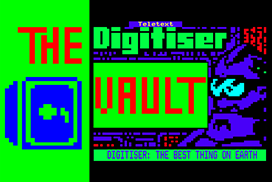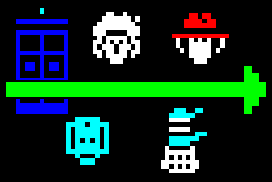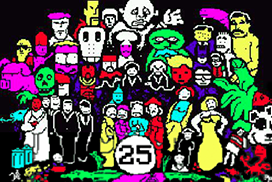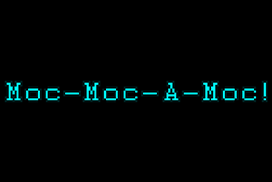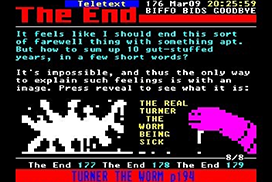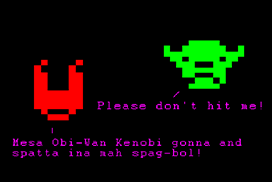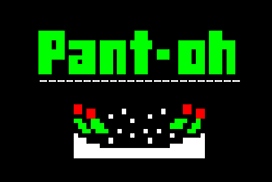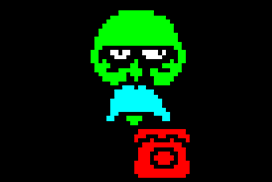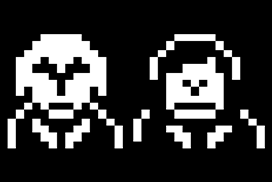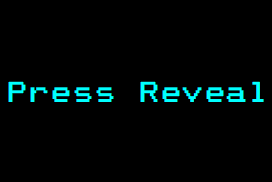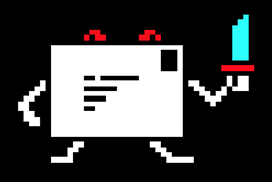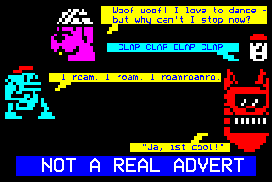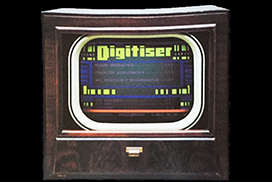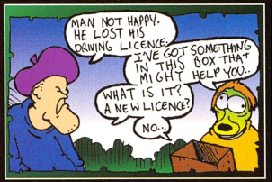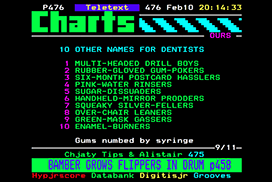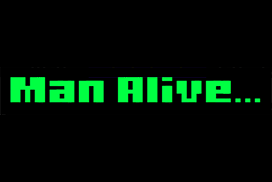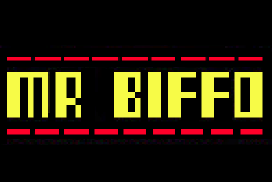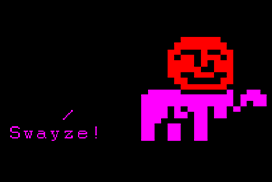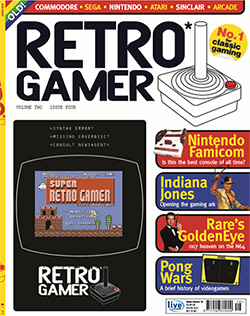
In 2005, two years after Digitiser ended on Teletext, Retro Gamer magazine published a loving tribute in issue 16. It featured a retrospective of Digi, and for the first time, an interview with both Paul Rose (Mr Biffo) and Tim Moore (Mr Hairs) - the full article is reprinted here.
Desert Island Disks
Over the course of one evening and several pints, Paul Drury talked Teletext with Mr Biffo and Mr Hairs, the guys behind Digitiser
Man Diary – AD 2005
"I have managed to get a job as a games journalist on Teletext and the long hours and constant beatings I receive from management have resulted in me having intense hallucinations. I recently thought I saw the ghostly form of Noel Edmonds floating above my Mega Drive and imagined I was playing a Mario fighting game with the moustached plumber wearing bondage gear. Then, somehow, I made Dirty Den say the C-word on EastEnders.
"Imagine my surprise when I found out it wasn't an hallucination at all!"

|
If this paragraph brings back happy memories of the eminently employable 'The Man' and his strange tales of clown shoe shops and pet swans, then Mr Biffo (aka Paul Rose) and Digitiser, the Teletext games section he co-founded and presided over between 1993 and 2003, will be familiar to you. Maybe it became an integral part of your daily routine – get up, use toilet, put kettle on, check Digi – and you're already reminiscing about the terrible jokes of The Man's Daddy, the mumbling Zombie Dave and the fake film script extracts.
If none of this is making any sense, then you've messed-up and missed out on a decade of surreal humour, sparkling wit and the unexpected inclusion of minor EastEnders character Danny Taurus as a centrefold, sporting a hairstyle which bore an uncanny resemblance to an erect penis. Oh, and they wrote about games too.
"The funny stuff wasn't planned," explains Biffo. "We were just trying to do stuff that shouldn't be there, that made no sense being there at all. I don't know if I'm annoyed the games coverage is less remembered. Not really. But without that, it wouldn't have worked."
And it certainly did work. Despite Biffo describing Teletext as "the scrag end of journalism", the pages attracted an audience of 1.5 million viewers at Digitiser's height in the mid-90s and boasted some celebrity fans. TV presenter Violet Berlin gushingly describes Biffo and his partner in crime, Tim 'Mr Hairs' Moore, as "the best videogame journalists in the world", and admits to stalking them before becoming a regular Digi columnist. Then there's Alex Garland, author of The Beach , who successfully won a competition involving holding up a placard bearing the legend 'Digitiser = Filth' in an exotic location (he persuaded a friend to do just this atop a temple in Thailand), and was planning a feature on the Digi phenomenon for The Independent before he hit the big time.
But how do you describe a job that involves knocking out daily updates on videogames and industry news, and accompanying them with a cast of nonsense-spouting characters rendered in the primitive blocks of Teletext graphics?
"When people asked what I did, I tended to mumble and change the subject. Tim called it the 'choke on the cashew moment'. To this day, my mum doesn't know what I actually did for a living."
Earning stripes

|
It should be expected then that the route to such an unusual career would not be straightforward. Though Biffo's childhood in London, which he still calls home, did involve many hours playing on an Atari 2600 and later a Spectrum, his programming didn't go much beyond writing rude words on the shop display computers in John Menzies, though he does recall with a grimace his one attempt at game design.
"This is terrible, and I was only 11 and didn't really know what the word meant, but I did produce a design on paper for 'Ronnie the Rapist'. It was loosely based on the Horace games and I did a series of screenshots of mazes in parks and bushes… you can gather what happened. Shameful."
Biffo spent much of his time at school drawing and a career in graphic design seemed most likely. At 15, he got a part-time job at Ladbrokes producing images for its in-house information service and even succeeded in creating a Pole Position pastiche spread over six screens – quite an achievement with only 16 frames of animation on a loop. His increasing ability in the archaic, highly specialised niche of Teletext-style graphics led to a job creating images for the Wembley scoreboard ("probably the cushiest job I've ever had – my boss was at the other end of the stadium and I never saw him.") and at the end of 1992, he secured a position at Teletext. The company had just won the contract from Oracle and were actively looking for new ideas.
"I ended up sitting opposite this guy Tim Moore, who I thought was a bit stand-offish and a bit flash – he dressed well and I didn't, and he just seemed more experienced and worldly wise. I didn't know what to make of him. He was writing for the teen section, which included game reviews, and being a games fan, I suggested to him we did a whole games section, even though I hadn't ever done any writing before. He just shrugged – he was kind of noncommittal and saw it as a job, whereas I was this enthusiastic 21-year-old – but he said OK, as it got him away from writing about lipstick."
The management also said yes, and soon the pair were inseparable. "I clicked with Tim straight away when we started writing together. We shared that sense of humour and were basically naughty little boys trying to make each other laugh, which was weird because we were both parents. And we were both aware that Teletext was shit, yet we had this ludicrously good job of reviewing games with complete autonomy. We decided everything and no one saw it before it went out. We sat in this cubicle in the corner away from the editor's office, looking over each other's shoulders and tinkering, just trying to out-do each other."
It was an unorthodox setup and helped to make Digitiser unique. The limit of 60 words per page and daily deadlines meant there was no room for waffle. The lack of screenshots left space for the array of colourful characters and their bizarre insights. A lead time of three minutes gave them a huge advantage over printed games magazines when it came to revealing industry developments. Perhaps most tellingly, the very nature of the medium – pages were visible for a day, then gone forever, with no record ever kept (though later, fan sites would lovingly archive much of the material) – meant it wasn't even a case of becoming tomorrow's fish and chip wrappers.
"We didn't endlessly rewrite stuff – we'd do it, chuck it up on screen and forget it. We didn't care as much about what we wrote because it was so disposable and in an ironic way, the fact it doesn't exist anywhere has meant it's endured. People will always remember it as slightly better than it was. I have this feeling that a lot was just being self-indulgent, Tim and I making each other laugh. But it seemed to strike a chord."
To be this good...
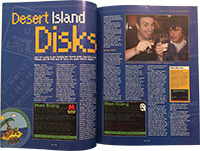
|
Their humour, honesty and fearless independence led to a devoted following of readers, though Biffo admits if they'd known just how many people were running downstairs in a morning to switch on, they probably wouldn't have been so funny.
"We didn't know people were watching, certainly not till near the end. Yeah, we got loads of letters, but they tended to come from the same people. We thought there was about 19 people totally obsessed by us and everyone else wasn't bothered. That's probably how we managed to put so many noses out of joint." Right from the off, the pair incurred the wrath of the Amiga community by declaring they weren't covering a "dying format" ("We had loads of irate Amiga owners complaining and we relented – in fact we managed to blag a free Amiga out of it all"), and had little truck with self-important PR reps, as Biffo's retelling of a visit to Sega's PR company illustrates.
"The bloke had kept us waiting in reception for ages and we overheard what games were going to be bundled with the 32X, which we reported. He was livid. Then we saw a pre-release copy of Mario 64 playing in his office. We reported that and he was livid again. And we drew a big cock in his notebook when he wasn't looking. I imagine he wasn't best pleased with that either."
Interestingly, Teletext management was initially very positive about Digitiser, with the features editor taking Biffo and Hairs out to lunch and declaring "You boys are the saviours of Teletext!" The honeymoon was short lived though, after Digitiser made an apparently innocuous remark about someone playing on a Mega Drive, when an image of Noel Edmonds had mysteriously appeared above the console.
"The same editor rang me up and asked if it was supposed to be satire. I mean, 'No, he really did come out of a Mega Drive!?' But somehow, this led to a headline in The Sun saying 'Teletext Rapped Over Sick Videogame Joke'. We were immediately labelled as troublemakers. It was a constant battle after that, and we were only a month old. There were forces in Teletext that really hated us. We weren't being paranoid – we've seen the secret memos that got sent round."
The suits, the squares
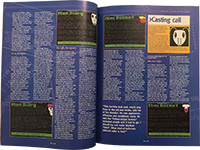
|
The ongoing interference from management manifested itself in the frequent removal of whole pages of Digitiser, without informing the boys, or even the changing of punch lines to the already barely understandable jokes of The Man's Daddy. It appears the hatred was mainly borne out of a lack of understanding – the powers that be just didn't get the jokes, and that made them angry – though you have to have some sympathy for the hapless sub-editors who were responsible for sifting through the pages of esoteric innuendos and catchphrases.
"They were paranoid we were sneaking in filth – which just made us want to do it more. And they'd usually miss the really dodgy stuff, and overact crazily when I mentioned 'the 3 Rs' or said 'finger the index'.
"I remember one sub-ed called Emma – subs changed every week or so – and we'd just done this spoof French-English dictionary. It was Friday afternoon and she'd had a whole week of wondering 'What does that word mean?' and 'Is that rude?', which had obviously worn her down. Her eyes were sunken and she just said 'Please, I can't be bothered to read it, just take it off and put it on next week when it's someone else's job'."
Yes, producing Digitiser was a job like no other, and Biffo fondly remembers those first four years working with Mr Hairs as "the best time I've had doing anything." But all good things come to an end, particularly if your bosses are looking to give one of you the push and as Biffo was vitally useful to Teletext as a whole for his graphics work, it was Mr Hairs who was to get the boot first…
…And right on cue, in walks the man himself, Tim 'Mr Hairs' Moore, as charming and dapper as Biffo had described, and proceeds to retell the strange tale of how former GamesMaster extra and games hack Dave Perry got him the sack.
"Dave was on our case because we'd called one of the mags he worked on 'irrelevant'. One of his lackeys phoned up and threatened to sue, so we changed it to 'irreverent'. Then an industry insider we knew told us Dave had been hauled over the coals by his boss about poor circulation figures. I got dragged into my editor's office – Biffo was off on paternity leave – and he demanded I tell him my source. I refused and got fired. They even frog-marched me off the premises, in case I tried to put a spunking cock on the Teletext index page, which was viewed by 25 million people daily. To be fair, we had got that graphic all ready for just this sort of occasion."
With Mr Hairs gone, Biffo kept on writing, though he describes the next four years as "a long drawn out death", a rather harsh verdict, as Digitiser retained its inimitable style and in fact the accolades from fans and complaints from detractors actually increased. The roller coaster ride continued unabated until the tragic events of September 11th. With the holiday advertising revenue that Teletext relied on so heavily in terminal decline after the terrorist attacks, Biffo was unceremoniously told by his superiors that Digi's content was to be halved and he must remove all the humour.
"This horrible Irish troll, who'd only been in the job two weeks, told me of the decision. He was aggressive, offensive and needlessly nasty. He said the 'Python-esque humour' excluded people and it had to go. I should try and make Digitiser 'bland'. What kind of ludicrous editorial edict is that?"
Demoralised, but still appreciating the pretty good money Teletext paid and the free games, Biffo continued 'out of habit', until the following summer, when the sheer volume of complaints about the new sanitised Digitiser forced the management to make an abrupt volte-face. He was called into a meeting, where the bosses acknowledged their mistake and pleaded with him to put things back to how they once were.
Mr Hairs can't resist chipping in: "I don't miss Teletext at all, but I'd have loved to have been at that meeting, shovelling humble pie down their throats."
It's a poignant reminder of the bond between these two hugely talented friends. When Biffo goes to the bar, Hairs is quick to praise his partner's passion for games, which kept the whole thing going, and when it's time for Hairs' round, Biffo eulogises on how much Tim taught him about the art of writing, describing their time working together as 'my university' (Tim's way with words recently bagged him 'Travel Writer of the Year' at the Press Awards). And the mutual back-slapping continues as I get the drinks in, and Biffo enthuses about our own Retro Gamer.
"When I got the issue with the Your Sinclair tribute, I realised how much it must have influenced how I write. I was genuinely moved. And it brought back some lovely images of T'zer in short skirts."
Moc-moc-a-moc!
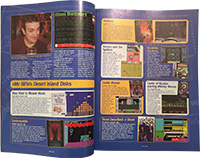
|
So as Digitiser approached its 10th anniversary, it was restored to its former glory, at least for a while. Then Biffo received an ominous call from his editor on 8 December 2002, stating they were "planning some changes" in the new year.
"I turned to my wife and said 'They're doing it again'. I just didn't want the stress, plus I'd just got job offers from EastEnders and a kid's TV show and I didn't need the money. It just seemed the right time to call it a day. Digitiser had been 10 years of my life. It was kind of like a play – Tim leaving was the 'oh fuck' moment at the end of Act One, then having to remove the humour was the 'oh shit' at the close of Act Two, and then them admitting they were wrong and letting me go out on a high was just the perfect ending. And I did get to use that spunking cock after all."
Yes, Turner the Worm 'being sick' did indeed grace the final Digi page, but Biffo hadn't quite left games journalism behind. He still writes a regular column for Edge magazine, where the anarchic spirit that made Digitiser such an adored institution lives on, and some of that pushing against authority continues in his script writing for My Parents Are Aliens and EastEnders. So, just how did he get Dirty Den to swear on national TV?
"I wrote the line 'We'll be alright with these two big Constables' and Lesley Grantham said it perfectly – he almost hyphenated it. Bless him."
As last orders is called at the Glasshouse Stores in Soho where we've been drinking all night, I decide it was appropriate to get a round of gin and tonics in, the drink so often praised in the pages of Digitiser, and wonder, as Biffo and Hairs frequently used the excuse of "being drunk" if readers disagreed with their verdict on a game, whether their writing was ever enhanced by the liberal use of alcohol?
"No" they both assure me. "It was all done on tea, coffee and Quavers." So, describing themselves memorably as "pilled-up Jacobites" was also factually inaccurate then? There's a pause. "Well there was this time when Ocean Software did this fantastic trip to an Oasis gig, and I spent hours looking at a biscuit…" confesses Biffo.
As we sup up, Biffo regales me with one final anecdote, a testament to the devotion of Digitiser's readership.
"When I finally left, I announced on the Edge forum I was having a leaving do here, in this pub, and people came from all over the country. I think it was only then I realised how big Digi was, and by then it was over. It was one of the best nights of my life, but I wouldn't want that all the time. It was like being in a freakshow. Alex Garland was there, people from Zed Two… and there I was chatting with this bloke, when suddenly he hugged me and said 'Thank you, I grew up reading Digitiser'. It was slightly surreal. I mean, it was only this pissy little Teletext thing." Maybe, chaps. But it seemed so much more.
Web-Me-Doo
There are several Digi appreciation sites on the Web, but the one we're most drawn to is located at www.moleman.freeserve.co.uk. Featuring the complete cast of characters and some classic pages from Digi's glorious past, it's a fitting tribute to the toil of Biffo and Hairs.
Casting call
It had a cast of thousands, but when Digitiser is rightfully made into a Hollywood movie, who would Biffo like to see in the lead roles? "Simon Callow playing Edward Lear and Jean Reno starring as Le Chef. And The Man's Daddy would have to be in it. He was always my favourite – he wasn't funny and that's why he was funny. I knew half the people reading it would be scratching their heads, going 'What's this?' But as he was a half elephant, half insect hybrid, he'd have to appear as a special effect. No human could portray him."
Mr Biffo's Desert Island Disks
Alex Kidd in Miracle World
Sega, Master System, 1986
Undoubtedly, there have been better platform games both before and since, but Alex Kidd was the first game I bought on my Master System, and my Master System was the first thing I bought with my first ever wage packet. I'd just got a job working for Ladbrokes Racing as a graphic designer, and couldn't believe quite how much I was getting paid. I hadn't realised at the time that the idea was to make it last the whole month. But Alex Kidd, and the Alex Kidd music, always bring back happy memories of my marginally more innocent days. Plus I'm a firm believer that the side-on platformer is a genre in need of a proper resurrection.
Underwurldele
Ultimate, Spectrum, 1984
Terrible confession time now. I can remember going to Brent Cross shopping centre with my Mum, and having to entertain myself while she bought my Christmas presents. I can remember going into John Menzies, and picking up a copy of Do They Know It's Christmas. And I can remember getting home, sneaking into my parents' bedroom, sneaking back to my bedroom with the copy of Underwurlde she'd bought me, and loading it up. And then having to act surprised when I unwrapped it on Christmas morning. Shocking.
Outlaws
LucasArts, PC, 1997
Whilst Half-Life is probably my favourite game of all time, Outlaws gets on this list by virtue of being the underdog. It's one of the most underrated games of all time, and pioneered the use of sniper scopes, and train levels – both elements of the first-person shooter which are still being recycled today. It was incredibly atmospheric. I'll always remember being trapped inside a fort, down to my last sliver of health, barely any bullets, surrounded by bandits calling me out…
Horace and the Spiders
Psion, Spectrum, 1982
Christmas morning, 1982. I came downstairs to see our TV flashing the message "Merry Christmas, Paul", courtesy of a brand new Spectrum my dad had sat up programming the night before. Horace and the Spiders was the first game I loaded up (I also got 3D Haunted Hedges). Whilst I'll gladly admit it's a pile of gritty turds, for the sheer nostalgic twangs it invokes, it has to be in this list.
Scrabble
Ubisoft, GBA, 2002
I stumbled upon this quite by accident, when I was staying in a hotel room in Brighton a couple of years ago. I don't even know where it came from – it was sitting at the bottom of my daughter's GBA carry case, but I certainly don't remember buying it. It was the only game I could play and actually see what I was doing – the GBA was never designed for low-light conditions. I was immediately addicted. After Tetris it's probably the most pure handheld game there is.
Castle Master
Incentive, Atari ST, 1990
I'm a first-person shooter addict, and it's probably fair to say that it all started with Castle Master. Ground-breaking 3D graphics made for a stunningly eerie environment that literally gave me nightmares. You've not had a bad dream until you've dreamt there's a giant, fire-breathing polygon living in your attic. I also remember there was a hollow wooden cow in there somewhere. The game, not the dream. Or my bed.
Castle of Illusion starring Mickey Mouse
Sega, Mega Drive, 1990
To this day I still think this is one of the best-looking, best-sounding platform games ever. For me it was the game that finally justified the £189 I paid for my Mega Drive – a controversial purchase at the time, given that my girlfriend was expecting a baby. The parallax scrolling made my hair stand on end, and the final boss level is truly creepy.
Skool Daze/Back 2 Skool
Microsphere, Spectrum, 1985
Despite the confusing, convoluted controls and simplistic graphics, these are without a doubt my most fondly remembered games. They're an absolute pain to play – with a different key for each specific action – but as a 12 year-old it was sublime to play a game with a setting that I could relate to. You can stick Trashman and Everyone's A Wally in that category too – fantastic exponents of mundane, British suburbia. Do today's kids really relate to ghetto pimps, and micro-skirted zombie killers?
Do you know of any important moments from the annals of Digi history that have been omitted? If so, then mail me (superpage58@gmail.com) right now, man. Credit will be duly given for anything that gets put up.


